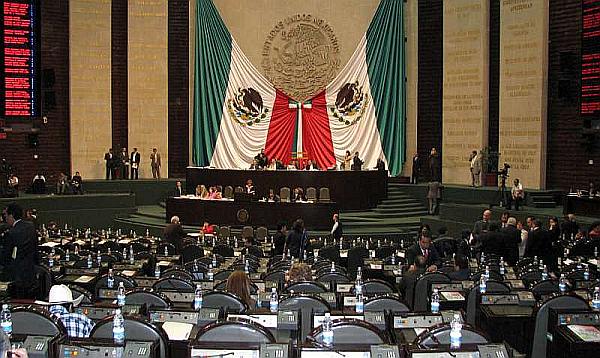Mexico City, Mexico - On Tuesday, Mexico's Senate gave final approval to a wide-reaching but watered down labor reform bill in the biggest shake-up of the country's job market in more than forty years.
The bill, which was already approved by the lower house, now goes to President Felipe Calderon for his signature. He originally proposed the measure.
The bill's approval, by 99 votes to 28 against, came after a prolonged struggle between the outgoing National Action Party (PAN) and the pro-union Institutional Revolutionary Party (PRI) of president-elect Enrique Pena Nieto. The PRI has traditionally relied on the union's support.
The measure's supporters predict it will create hundreds of thousands of new jobs. Critics say the bill strips away job protections and seniority while doing little to combat the debilitated leaderships that have spent decades in control of many unions.
"This is going to affect the rights of young workers to get seniority. It is generating the loss of rights for a whole generation of workers," said Sen. Alejandra Barrales of the leftist Democratic Revolution Party.
The bill doesn't do away with seniority, but makes it less of a factor in promotion, and the measure permits probationary and training contracts.
"We shouldn't underestimate what we have," said PAN senator Javier Lozano. "It is a very good labor reform economically speaking which will really stimulate competitiveness and productivity, and will modernize labor relations."
The bill contains a raft of measures, including changes that would make it easier for firms to hire and fire workers and shorten labor disputes. The new measures will make work contracts more flexible, enshrining trial periods and initial training contracts in labor law.
Salaried workers in Mexico, about one-fifth of whom are unionized, have long counted on health, housing, severance, and profit-sharing benefits to somewhat offset meager wages. The overhaul could make it harder for workers to get full benefits, if companies try to abuse probationary contracts or outsource their employees to smaller firms with fewer assets or responsibilities.
Outsourcing and part-time employment already exist in practice in Mexico, and the new law will explicitly allow them - under certain regulations. For example, a part-time worker could never earn less than the daily minimum wage of about $60 pesos ($5) a day.
The reform also strengthens the rights of women, including outlawing gender-based discrimination and helping mothers plan their work schedules.
Unions Escape Transparency Clauses
Unions will have to publish their regulatory statutes on the Ministry of Labor's website, but the parts of the bill that sought to make unions more transparent were cut back - including rules to force them to show how they manage members' fees.
Some legislators had proposed requiring unions to submit proposed contracts to union members for approval and elect their leaders by secret ballots. Both of those clauses were stripped out in the lower house. The Senate agreed to pass the bill along to Calderon without the democracy clauses.
Mexican unions are so undemocratic that, when opening new factories, employers sometimes select a docile union for the new facility and the first workers enter with a contract already signed behind their backs. Many workers don't even know the name of the union that supposedly represents them and takes their dues.
The new bill does try to make unions "somewhat" more accountable for how they use member's dues money.
Union "democracy was not completely eliminated," said Calderon's labor secretary, Rosalinda Velez. "Even if the president's original proposal was not preserved, there is important progress in union democracy."
Source: Reuters


